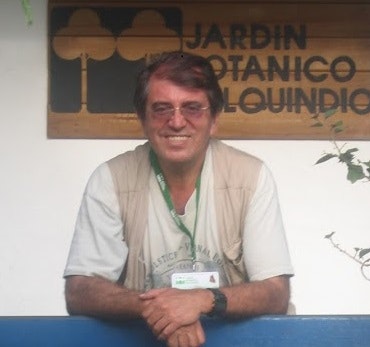A conservation programme for the endangered native plants of Colombia
Colombia is a country of great floral biodiversity, home to approximately 40,000 plant species and almost 20% of the world’s total flora diversity. Many of these plants, as well as being naturally scarce, are also highly valuable for their medicinal and nutritional properties and other potential commercial uses.
Despite this, the rate of destruction of Colombia’s natural forests is a startling 600,000 hectares per year, a loss of almost 3 acres every minute, day and night. It is feared many species of plants may be being lost before even having been discovered. The causes of this ecological drama are diverse and complex – socioeconomic inequality, political conflict, ignorance and technical inefficiency together make effective conservation of the plants of Colombia a daunting task. As the forests are cut for timber and land cleared for livestock and cultivation, scientists estimate that no less than 2,500 Colombian plant species are in danger of extinction.
In the face of these somber facts, Alberto Gómez-Mejía is leading a conservation programme to prevent the extinction of many of the useful and endangered native plants of Colombia. A lawyer by training with specialisation in socioeconomic science, Alberto has helped develop Colombian environmental protection legislation and is involved at a high level in both Colombia’s leading biological research institute and several of Colombia’s botanical gardens. As such, Alberto is well placed to lead this innovative initiative which ambitiously seeks to implement a national endangered plant conservation programme.
Alberto’s strategy is to cultivate native plant species which are of use to local communities to establish ex-situ germplasm collections which can then be propagated for cultivation in 17 Colombian botanic gardens and associated backup collections on public and private lands across the country. As well as being a genetic store for plants threatened in the wild, the germplasm will also provide new opportunities for local communities and will be used to support sustainable development initiatives that will generate incomes for local people without further depleting wild stocks of economically valuable plants.

In combination with a campaign to help raise public awareness about the importance of Colombia’s wild plants at a local level and the need for conservation action, Alberto is confident that the project can make a difference. By building capacity in Colombia and addressing the lack of scientific and technical knowledge about the domestication of native species that currently exists, the project will safeguard some of the most endangered plant species whilst also ensuring they are available to support sustainable development in Colombia.
PROJECT UPDATE
2023 Continuation Funding
Nurturing native palm species to tackle food insecurity
£50,000 over 2 years
Around 20% of Colombia’s 265 palm species are in danger of extinction. 2005 Whitley Award winner Alberto Gomez-Mejia works to secure a future for two of these palm species; Palma taparo and Chontaduro, which are widely used as food plants in a country where 51% of the population experiences food insecurity. His work centres on ensuring genetic variability in the two species, reintroducing some into the wild as a restoration scheme and developing plantations for their stable growth and sustainable use.
Alberto and his team at Instituto Humboldt will work with the local communities to aid the recovery of wild populations of the palms; collecting data on the palms’ population status and reproductive ecology in Colombian central Andes. Together with his team, he will implement an education strategy to share knowledge of the species with those who rely most on its existence.
Continuation Funding will help to future-proof this work, upskilling members of Alberto’s senior team and supporting the development of Germplasm banks of the species – highlighting the importance of regional botanical gardens in researching and conserving endemic species.






